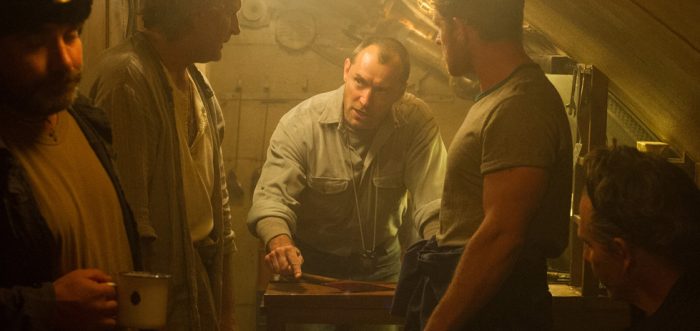
There’s a shot in Black Sea that bisects the frame with the back of an aristocrat’s head. Talking to him from different halves of the screen are a disparate pair of actors. On the left is Scoot McNairy, a journeyman, slinking through yet another of his dozens of guises: a nervy businessman named Daniels who is pitching a submarine dive for Nazi treasure. On the right is Jude Law, much better known than McNairy and trying his hardest to work around that. He’s playing a gruff submarine skipper, Robinson, who wants a pay-out after having been fired from his years of salvaging. To that end, he adopts a hunch, wears thick sweaters, scowls and speaks in a Scottish brogue. Such noticeable self-configuring is often reserved for Oscar-contending films, but while director Kevin Macdonald earned a few statuettes with The Last King of Scotland, he is only dialled into pulpy thriller mode here. His message is pretty clear: these central characters are from different sides of the track, and Robinson is the one with elbow grease whereas Daniels is the weakling who bleeds green. He loudly announces that difference, loud so the back row will understand, and that’s OK. His aim is to propel us through declarative plot points and set designs in the manner of desperate adventures come before.1 The result is mostly enjoyable, and exactly as unsubtle and lightweight as his and DOP Christopher Ross’ compositions.
The crew that Robinson assembles with the rich man’s money is a mix of men from the UK and Russia, and tension rises from each party not being able to speak the same language, or make do with a split payload. We know that tension exists because the characters kindly reiterate what is going on in a glib-one-liner; why a plan is mad, how a team member has gone mad, the very nature of madness, etc. Such is Dennis Kelly’s script, flagging the next complication rather than dwelling on anything remotely resembling day-to-day mentality. Selling that broad approach is a sterling supporting cast, including the likes of Ben Mendelsohn2 and Michael Smiley, who are charming and varied enough to overlook inconsistencies in their characterisation. Some of it suggests an intriguing role reversal, since one character who is quick to kill early on has to be goaded into doing it later by someone on an opposite trajectory, but they’re too busy taking the piss out of each other to make such transitions gradual. Robinson is the one clearly afforded an arc by having him be an ersatz father to Tobin (Bobby Schofield), a wet-eared boy treated as a bad omen by the Russians. While the ending marks an observable change in them both, flashbacks to his wife (Jodie Whittaker) only makes it lean farther into tedious masculine chest-thumping, which the sardonic exchanges do a lot to ossify.
As with the rapport he kindles between the seamen, Macdonald doesn’t slouch on easy tricks. He compounds the tension with the interior of the sub, stitched together from several interiors and green-screen assists. The lighting transforms the surroundings to fit everyone’s mental states, with customary red alerts, luminous spotlights, and the blue-tinged darkness of the title bearing in on them like their own paranoid impulses. The effect rolls into the action sequences, largely consisting of stress-fuelled set pieces evolve from the excavation efforts and machinations of the ship. One highlight turns a piece of undersea rock-transporting equipment into a lighter variant of the pram from The Untouchables, with every jostle doing the same to the audience’s collective heart. Macdonald is no De Palma, of course, but his staging is clean enough to get caught up, as does Kelly on the page.
It’s interesting that Law should throw so much effort into his performance when the movie he’s in doesn’t really cry out for it. It’s not a misguided idea by any means; just last month, ’71 showed how a complex wartime story can come to rest in both an action-heavy story and the physical acting of its hero. Perhaps Black Sea had that at some point, given its opening use of WW2 footage and half-hearted plays on class friction, but the whole film isn’t so thematically conscientious. It’s a one-and-done project, seeking only to interest and entertain for a wee spell, with Law as a bargaining chip rather than a sequel-ready tentpole pitcher. I’m sure that by itself will pique the interest of those tired of shared-universe heroes like in Marvel, Fast/Furious et al, and they will have a point. Despite what that puffing-up two-shot implies, it’s the sly efforts of the crew backing Robinson, on and off-camera, that save the day.
